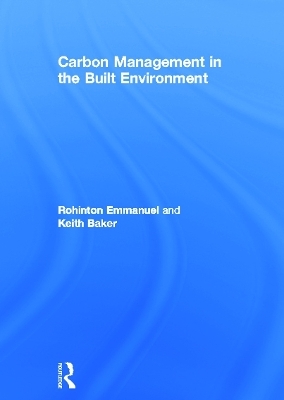
Carbon Management in the Built Environment
Routledge (Verlag)
978-0-415-68406-4 (ISBN)
Three broad sectors of the economy are generally recognized as key to a low carbon future: energy, construction and transportation. Of these, carbon management in the built environment remains the least well-studied.
This much-needed book brings together the latest developments in the field of climate change science, building design, materials science, energy and policy in a form readily accessible to both students of the built environment and practitioners. Although several books exist in the broad area of carbon management, this is the first to bring together carbon management technology, technique and policy as they apply to the building sector.
Clear and succinct sections on the overarching principles, policies, approaches and technologies are combined with case studies and more in-depth coverage of the most relevant topics. It explains how to produce a simple carbon footprint calculation, while also being an informative guide for those developing or implementing more advanced approaches. This easy to read book is the ideal primer for anyone needing to get to grips with carbon management in the built environment.
Rohinton Emmanuel is a Reader in Sustainable Design and Construction, and the Director of the Centre for Energy and the Built Environment at Glasgow Caledonian University, UK. He has pioneered the inquiry of urban climate change in warm regions and has taught and consulted on subjects including climate and environment sensitive design, building energy efficiency, and thermal comfort. He has authored over 50 research papers in the areas of climate change in the built environment, building and urban energy efficiency and thermal comfort and a book related to these efforts, An Urban Approach to Climate Sensitive Design: Strategies for the Tropics, was published by Routledge in 2005. Keith Baker is a Researcher in Sustainable Urban Environments at the Centre for Energy and the Built Environment at Glasgow Caledonian University. He is also a member of the Scottish Carbon Accounting Group, and a founder member of ICARB (the Initiative for Carbon) and a long standing columnist on electronic waste for The Display Standard, a trade publication for the electronics industry. Keith's main research interests are in climate change, energy, the built environment, and the environmental impact of technology.
1. Historical Background: from Sustainable Development to Carbon Management 2. Overview of Climate Change 3. Sectoral Approaches to Carbon Management 4. Energy Generation for a Low Carbon Built Environment 5. Carbon Management in the New Build 6. Carbon Management in the Existing Stock 7. Carbon Management in Cities 8. Operational and Embodied Carbon in Buildings 9. Regulations and Incentives for Low/Zero Carbon (LZC) Buildings 10. Tools and Assessment Systems for the Construction Industry 11. Carbon, GHG and Sustainability Accounting 12. Carbon Accounting in Organisations and Industry
| Erscheint lt. Verlag | 7.6.2012 |
|---|---|
| Zusatzinfo | 52 Tables, black and white; 30 Illustrations, black and white |
| Verlagsort | London |
| Sprache | englisch |
| Maße | 174 x 246 mm |
| Gewicht | 580 g |
| Themenwelt | Naturwissenschaften ► Biologie ► Ökologie / Naturschutz |
| Technik ► Architektur | |
| Technik ► Bauwesen | |
| Technik ► Umwelttechnik / Biotechnologie | |
| ISBN-10 | 0-415-68406-4 / 0415684064 |
| ISBN-13 | 978-0-415-68406-4 / 9780415684064 |
| Zustand | Neuware |
| Informationen gemäß Produktsicherheitsverordnung (GPSR) | |
| Haben Sie eine Frage zum Produkt? |
aus dem Bereich


